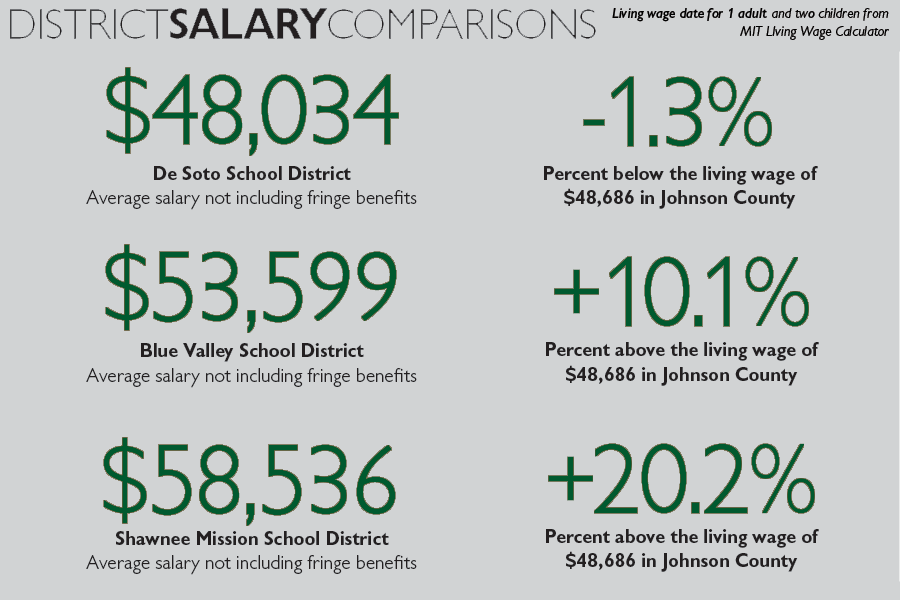Teachers and Board negotiate new contracts
Tentative agreement reached for contracts for the 2014-2015 school year
November 13, 2014
(Editor’s note: as of Monday, Nov. 17, the teachers voted against the proposed contract. The next step is to enter back into negotiations with the Board of Education. We will keep you updated with information as it comes.)
The De Soto Teachers Association negotiations team has reached a tentative agreement on the contracts for the 2014-2015 school year with the Board of Education. Currently, the teachers have contracts based on the 2013-2014 school year. The new contracts, which teachers are currently voting on, include no change in the teacher’s salaries in addition to a clause establishing a fair dismissal firing policy that will take effect in the 2015-2016 school year. This compromise comes late after negotiations that typically start in February.
Negotiations team representative Andy Shelly said the negotiations have been difficult due to differing ideas on salary.
“You have two different sides which have two different perspectives on what is a realistic salary increase,” Shelly said. “We feel teacher salaries should be a priority in the district and I think the district would like to see salaries to be higher but their belief is that they don’t have the resources to raise salaries.”
The district declined to comment on the issue.
THE DISTRICT’S BUDGET
The De Soto district’s budget is split up mostly into three main sources of funds: bond and interest funds, capital funds and operational funds.
Bond and interest funds are designated specifically for paying back investor who have given money to the district, including interest. This money is mandated for this purpose by the Securities Exchange Commission (SEC). Capital funds are designated for purposes such as building repair or new technology and these funds are mandate to be used for this purpose under Kansas state law. Operational funds are the funds used for normal activities and expenses in the district, such as teacher salaries. The district has no operational funds left in the budget for the 2014-2015 school year.
TEACHER SALARIES
The teachers have tried to negotiate for better salaries in the new contracts. The current average salary for a teacher in the De Soto school district is 48,034 dollars per year, including employee reductions such as fringe benefits and supplemental salaries. That’s compared to 53,599 dollars per year in the Blue Valley school district and 58,536 dollars per year in the Shawnee Mission school district.
Teachers have the ability to move up in salary each year. Each teacher’s salary is determined by a combination of his or her education and experience.
Since the 2008-2009 school year, the teacher’s average salary has seen a net increase of 8.1 percent. Again, that figure does not include fringe benefits or supplemental salaries.
According to Mill Valley teachers representative Jeff Wieland, inflation can distort salary information.
“In real dollars, I know that what I take home now is less than what I took home six years ago, and I’ve even gone up on the pay scale,” Wieland said. “Often people like to play around with nominal dollars to make it look like things are going up. It looks like I’m making a little more but I’m actually [making] a little less.”
COST OF LIVING
Cost of living has greatly influenced negotiations. Based on data from the MIT Living Wage Calculator, a teacher would have to currently have a masters degree and have worked in the district for 13 years in order to make enough money to support themselves and two children in Shawnee.
Communication arts teacher Dorothy Swafford sees the lack of a formal salary increase as a problem in relation to the cost of living increase.
“Everything around us goes up and in order for us to stay on top of it and provide well for our personal families you have to be compensated for that or else people will start seeking employment outside of our district that will compensate for their need,” Swafford said.
DUE PROCESS REMOVAL
Teachers are also concerned about the rights to due process and teacher tenure that they have had since a Kansas Supreme Court decision in 1957. Although Kansas passed a law in April getting rid of due process for teachers, school districts were encouraged by the state legislature to incorporate due process into teacher contracts. Currently, without due process, teachers can be terminated without a hearing.
A due process hearing means that when a teacher is fired, he or she has the right to be at a hearing where he or she will learn why the administration made the decision and have the right to defend himself or herself.
Wieland said the due process and fair dismissal (terminating a teacher according to the standards of due process) issue will prove to be imperative in his voting on contracts.
“I don’t think any of us support the idea of that getting rid of teachers [is] bad. It’s just that we want to be protected so you can’t just offhandedly fire teachers without explanation,” Wieland said. “I wouldn’t vote for any contract that didn’t include the fair dismissal policy because I wouldn’t want it changed without the consent of the teachers.”









